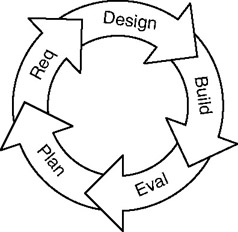Variations for Iterative Development
Various iterative development methodologies are currently being practiced, with Extreme Programming (the original XP[53]), Agile Methods,[54] and the Rational Unified Process (RUP[55]) being the most popular. How does semantic analysis fit in with iterative development?
Figure 9.4 characterizes the iterative methods: Development is done through a series of iterations, each one resulting in a functional system, which is tested and evaluated to determine what changes should be made in the next release. One of the basic tenets of iterative development is that getting the design right up front is expensive and unlikely to be successful. It is cheaper to build a working system and use that to determine the real requirements. This requires that the system be easy to refactor and change with each iteration.

Figure 9.4: Typical tasks in an iterative development methodology.
This approach works very well for many projects, especially smaller projects with highly skilled developers. Given that semantic elicitation adds little overhead to this or any other kind of development project, we would recommend it for all iterative development projects.
Because of the nature of these projects, it doesn't make as much difference when you do the semantic elicitation. Doing it before the project starts may help with the scoping and initial iteration plan. Doing it after an iteration or two ensures that the users and developers are well versed in their domain.
[53]See http://www.xprogramming.com/ for further information.
[54]See http://www.martinfowler.com/articles/newMethodology.html for further information.
[55]See http://www.rational.com/products/rup/index.jsp for further information.
EAN: 2147483647
Pages: 184
- ERP Systems Impact on Organizations
- The Effects of an Enterprise Resource Planning System (ERP) Implementation on Job Characteristics – A Study using the Hackman and Oldham Job Characteristics Model
- Intrinsic and Contextual Data Quality: The Effect of Media and Personal Involvement
- A Hybrid Clustering Technique to Improve Patient Data Quality
- Development of Interactive Web Sites to Enhance Police/Community Relations